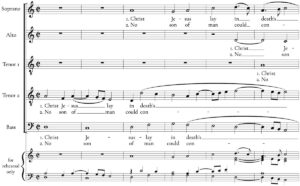
Johann Walter (1496-1570) is considered the first cantor of the Lutheran church. He set a standard of excellence in Lutheran choral composition that influenced many composers after him, and he is responsible for several of the tunes that are found in Lutheran hymnals.
In 1517 Walter began as a bass singer in the court chapel choir of Frederick the Wise, and he became closely connected with the Reformation, offering advice for the musical aspects of Luther’s German Mass. Both Luther and Melanchthon spoke highly of Johann Walter as a musician. In 1526, Walter started teaching at the Latin School in Torgau, a school with an enrollment of over 170 boys in need of musical instruction. Walter had a great impact in his role as a teacher—he taught one of Luther’s sons, and he also taught the father of Michael Praetorius, as well as the teacher of Heinrich Schütz—Praetorius and Schütz being arguably the two greatest Lutheran composers before J. S. Bach.
Johann Walter also impacted Lutheran music in his compositions, as he published in 1524 what would become the root of all Lutheran choral music, a collection of hymns arranged for choir called Geystlich Gesangk-Buchleyn. Luther wrote the preface for Walter’s collection, which contained many of Luther’s recently written hymns, and this choir hymnal became the basis of the congregational hymnal published in Wittenberg the following year. Pieces included in Geystlich Gesangk-Buchleyn include arrangements of “Christ Jesus Lay in Death’s Strong Bands,” “To God the Holy Spirit Let Us Pray,” and “Savior of the Nations, Come.”
Luther’s theology greatly influenced Walter’s understanding of music, and he wrote a poem expounding upon all the places in Scripture where music is mentioned, called “In Praise of the Noble Art of Music.” After relating in the poem numerous examples of music’s honored use in the Church’s past, he states that “All those who quarrel with this art / Are lame of brain and hard of heart. / But those who love to hear God’s Word / Love also to have music heard.”


Walter is also the author of the text of LSB 514, “The Bridegroom Soon Will Call Us,” which includes this beautiful picture of music in heaven:
In that fair home shall never
Be silent music’s voice;
With hearts and lips forever
We shall in God rejoice.
While angel hosts are raising
With saints from great to least
A mighty hymn for praising
The Giver of the feast.
Arrangements by Johann Walter

Christ Jesus Lay in Death’s Strong Bands (Walter)
“Christ Jesus Lay in Death’s Strong Bands” (Christ lag in Todesbanden), text and tune by Martin Luther (1524). Setting by Johann Walter (1525). Polyphonic, SATTB.

From Depths of Woe I Cry to Thee (Walter)
“From Depths of Woe I Cry to Thee” (Aus tiefer Not schrei ich zu Dir), text by Martin Luther (1524). Setting by Johann Walter (1524). Homophonic, SATB.

Lord Christ, the Sole-Begotten
“Lord Christ, the Sole-Begotten” (a.k.a. The Only Son from Heaven; Herr Christ, der einig Gottes Sohn), text by Elisabeth Cruciger (1524). Setting by Johann Walter (1524). Homophonic, SATB.

Now Do We Pray God the Holy Ghost (Walter)
“Now Do We Pray God the Holy Ghost” (Nun bitten wir den heiligen Geist), text st. 1 German, st. 2-4 Martin Luther (1524). Setting by Johann Walter (1524). Polyphonic, SATTB.

